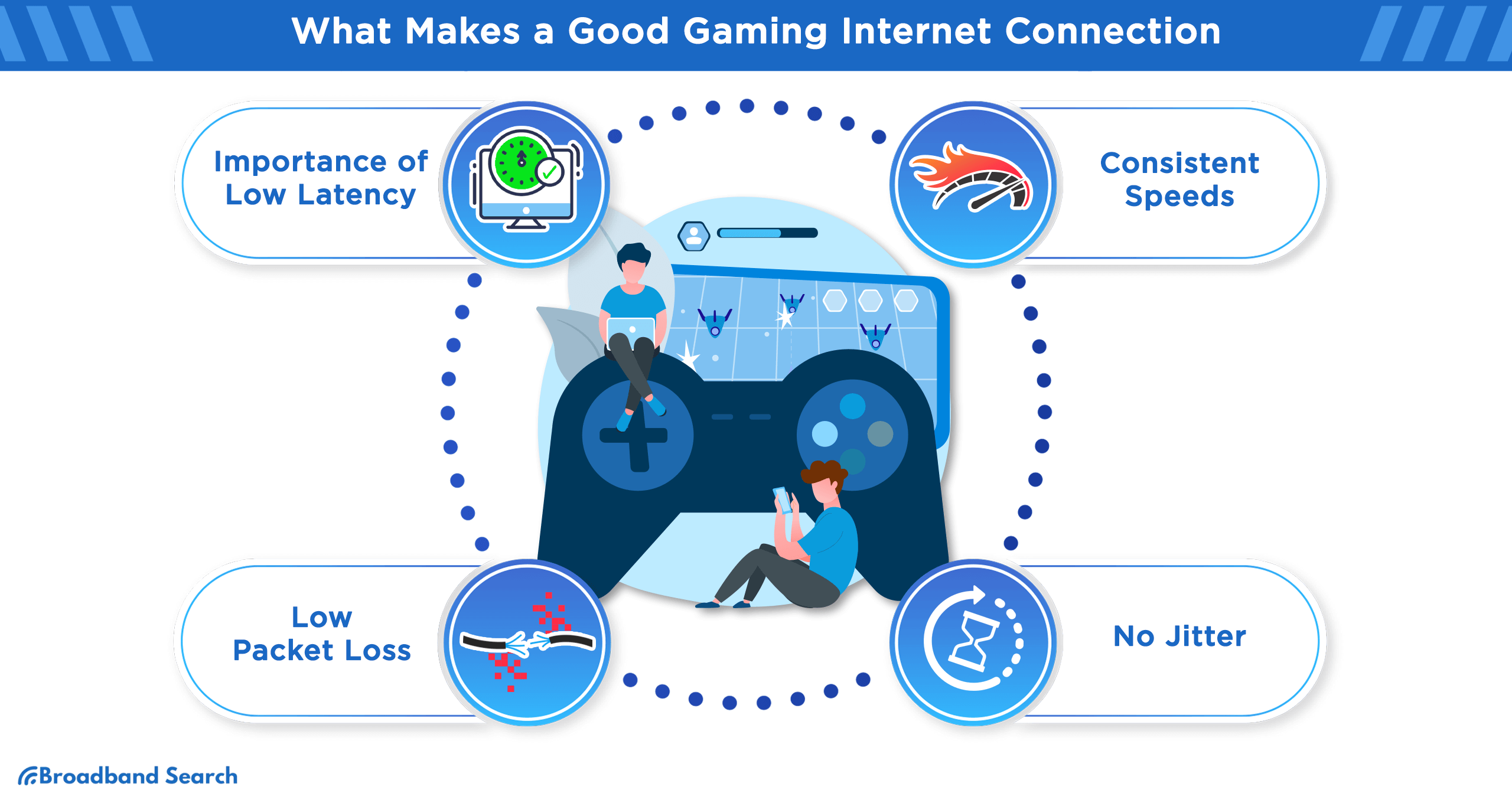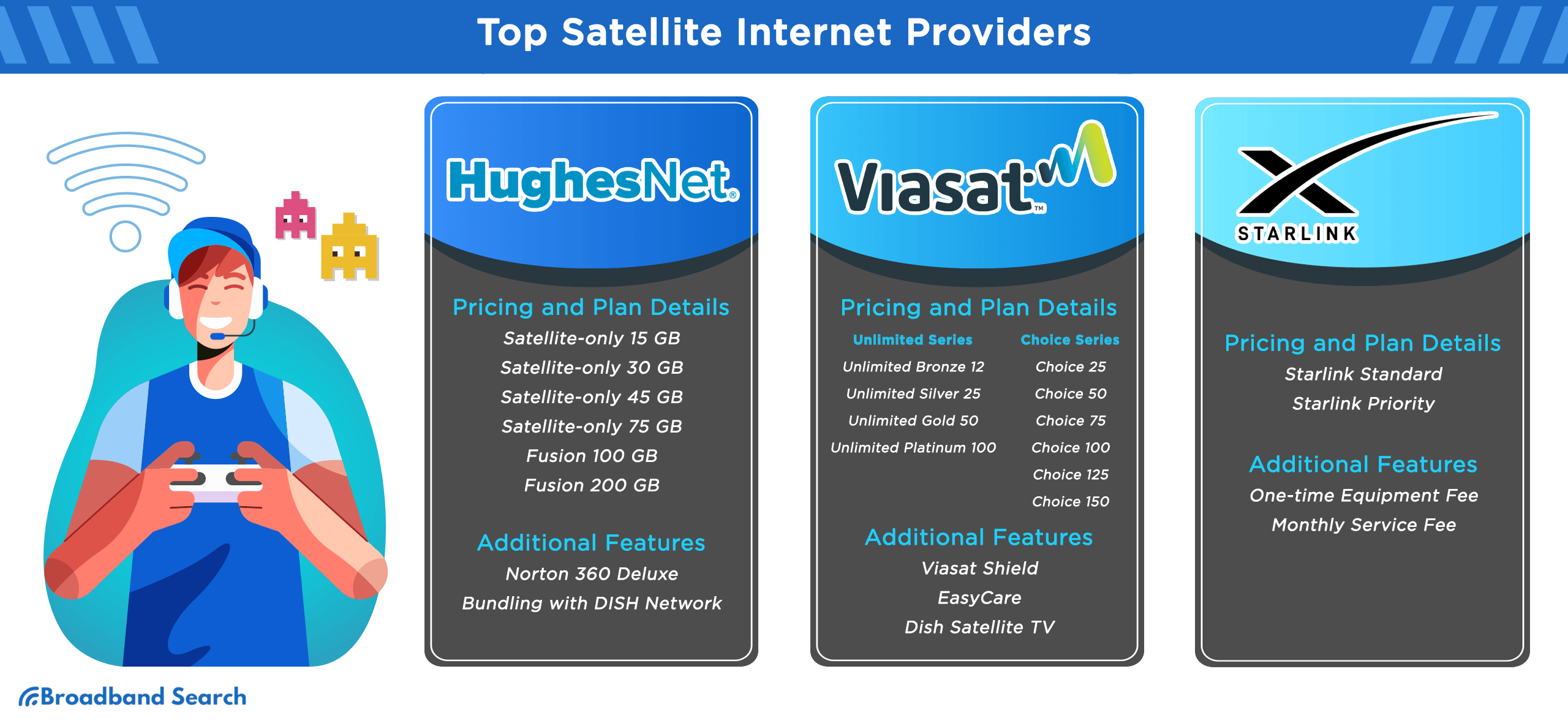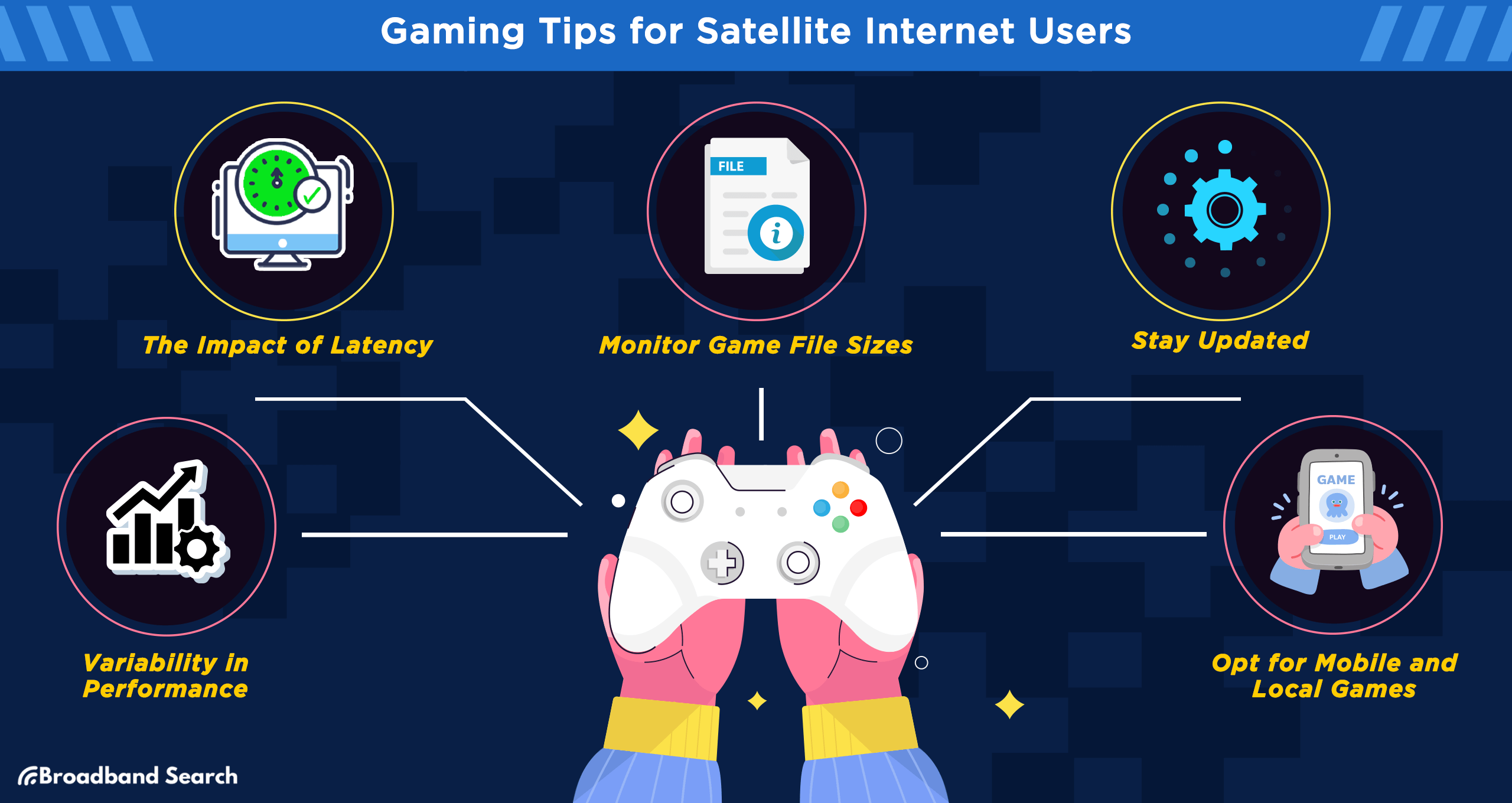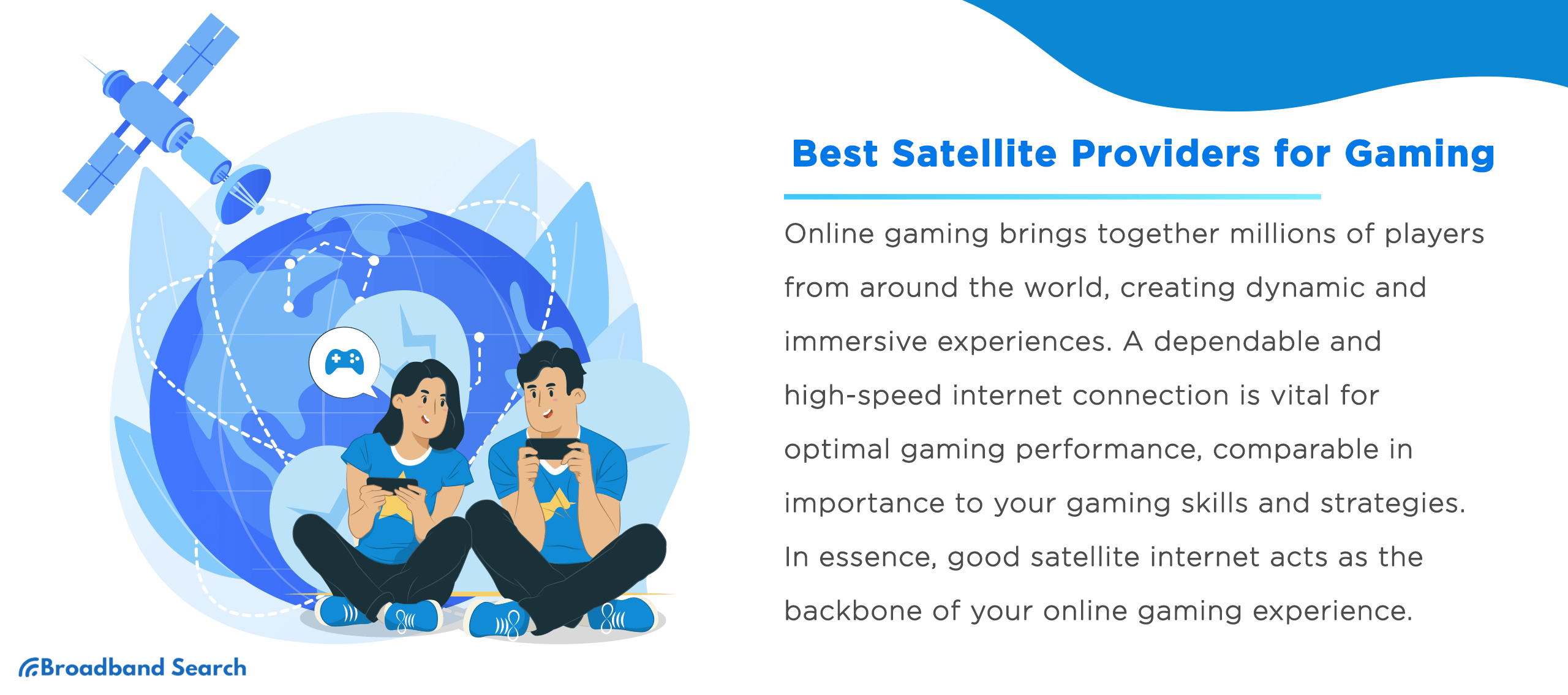In the heat of the game, when you're on a roll and your name echoes in the cheers of your team, you start to feel unbeatable. No virtual adversary stands a chance - but a slow, inconsistent internet connection does. Even the most skillful gamer is at the mercy of a robust, high-speed internet connection to maintain their edge in the gaming world.
For a long time, satellite internet was synonymous with a poor gaming experience. However, significant advancements in satellite technology and provider services over recent years have substantially enhanced its viability for gaming.
Let us explore the best satellite internet providers for gaming, explore ways to augment your gaming experience, and assist you in determining the optimal internet plan that caters to your unique gaming needs.
Understanding the Basics of Internet for Gaming
Online gaming is a dynamic and immersive world, bringing together millions of players from across the globe. Whether you're adventuring through mythical realms, battling in competitive sports, or solving intricate puzzles, the heart of this digital experience is a reliable and high-speed internet connection. In essence, the quality of your internet connection is as crucial to your gaming performance as your skills and strategies. The significance of a good satellite internet gaming can't be overstated – it's the backbone of your online gaming experience.
What Makes a Good Gaming Internet Connection

- Importance of Low Latency: Latency, often referred to as "ping," is the time it takes for data to travel from your gaming device to the game server and back again. It's measured in milliseconds (ms), and in gaming, the lower, the better. High latency can result in noticeable delays between your actions in the game and when they actually occur on screen. For instance, if you're playing a fast-paced shooting game, high latency could mean you press the trigger, but the game registers the shot a moment later - which can be the difference between a hit or miss.
- The Need for Consistent Speeds: Consistent, high-speed internet is crucial for online gaming. It allows for smooth gameplay and ensures that the game's visuals are displayed as intended, without any lag or buffering. The speed you need can depend on the type of game you're playing. Based on the FCC recommendations, a minimum of 3-4 Mbps download speed is needed for gaming, but for high-quality graphics and seamless experience, 25 Mbps or higher is preferable. For example, a game with high-quality graphics and lots of players may require higher speeds than a simple puzzle game.
- Packet Loss: Packet loss occurs when one or more data packets fail to reach their destination while traveling across a network. These packets, which are the basic units of information sent over the internet, represent every action you perform in an online game, from moving a character to firing a weapon. For instance, in an online chess game, moving a piece results in packets of data being sent to the game server. If packet loss occurs, the server might not register the move correctly, leading to potential glitches or lags in the game. This can significantly hamper your gaming experience, causing it to feel unresponsive or "laggy."
- Jitter: Jitter refers to the fluctuations in the time it takes for data packets to travel between points, such as your computer and the game server. Ideally, these packets should have a consistent travel time, but various factors can cause delays or speed-ups, leading to jitter. For example, in an online game like Fortnite, consistent low latency is important for smooth gameplay. However, if packet travel times start to vary, resulting in high jitter, you may experience gameplay disruptions like delays, freezing, or sudden jumps, even if the average latency is low. This can make the game feel slow and unresponsive.
Satellite Internet: Pros and Cons
When it comes to satellite internet gaming, the type of internet connection you have can significantly impact your experience. Satellite internet has its unique advantages and disadvantages that are worth considering if you're a gamer. Let's break them down:
Benefits of Satellite Internet
- Availability: Satellite internet is available virtually everywhere, including rural or remote areas where traditional cable or fiber-optic internet may not reach. This means that you can game from almost anywhere, as long as you have a clear view of the southern sky (in the northern hemisphere).
- Independence from Landline Infrastructure: Satellite internet doesn't rely on cables or wires, making it independent from terrestrial infrastructure. This can be an advantage in situations where landlines are disrupted due to construction, natural disasters, or other events.
- Competitive Download Speeds: Modern satellite internet services can offer competitive download speeds, often comparable to DSL connections. These speeds are usually more than sufficient for most online gaming needs, especially for turn-based games or those that don't require real-time interactions.
- Ease of Installation: Installing satellite internet usually just involves setting up a satellite dish and a modem, making the process fairly straightforward. This allows for quick setup and the ability to start gaming without extensive infrastructure needs.
- Improving Technology: Satellite internet technology has been rapidly improving, with newer satellites providing faster speeds and lower latency. Providers such as Starlink are already showing promising advances in this area, bringing satellite internet closer to par with terrestrial connections for gaming.
Drawbacks of Satellite Internet
- Latency: The most significant drawback of satellite internet for gaming is latency. Data has to travel to space and back, resulting in higher latency than terrestrial connections. This can affect gameplay, especially in fast-paced, real-time games where every millisecond counts.
- Data Caps: Many satellite internet providers have data limits, after which your connection may be slowed. Online gaming, especially with high-definition graphics or large updates, can consume a lot of data.
- Weather Susceptibility: Satellite internet can be affected by weather conditions. Heavy rain, snow, or even dense cloud cover can degrade the signal, potentially disrupting your gaming experience.
- Obstruction Issues: For a satellite signal to work well, the dish must have a clear line of sight to the satellite. Trees, buildings, or other obstructions can interfere with the signal, which can be a challenge in some locations.
- Cost: Satellite internet tends to be pricier compared to other types of internet services. This higher cost comes into play both in the initial setup—purchasing and installing the satellite dish—and the monthly service fees. While the improved access and coverage offered by satellite internet can justify the price in remote areas, it's a significant consideration for gamers on a budget.
- Difficulty with Fast-paced Games: Due to the latency issues, gamers who play fast-paced, competitive games may find satellite internet less suitable than other types of connections. However, for casual gaming or slower-paced games, satellite internet can be a viable option.
Top Satellite Internet Providers

Choosing the right satellite internet provider is a crucial factor for gamers, especially those in remote or rural areas where options might be limited. Several providers have emerged as leaders in the field, offering services that, while not yet on par with the best cable or fiber-optic connections, have significantly improved over the years. These providers are committed to enhancing their technology to offer better speeds, lower latency, and higher data limits, which are critical elements for a satisfying gaming experience. In the following section, we'll explore some of the top satellite internet providers suitable for gaming.
HughesNet
HughesNet is a leading satellite internet provider with a long history in the industry. It is a subsidiary of Hughes Network Systems, an innovator in satellite communications technology for over 40 years. The company serves North America and several other regions worldwide, offering a reliable internet connection especially for rural and remote areas where traditional cable or DSL services may not be available. With its commitment to continually advancing its technology, HughesNet provides a range of plans designed to cater to varying internet needs, including those of gamers.
Pricing and Plan Details
HughesNet has significantly advanced its technology in recent years, establishing itself as an industry leader with its innovative Gen5 plans, including the HughesNet Fusion.
- Satellite-only 15 GB: Starting at $64.99, this plan offers a download speed of 25 Mbps and an upload speed of 3 Mbps. While it meets the FCC’s baseline for high-speed internet, heavy online gaming, especially on data-demanding platforms like Xbox Live or PlayStation Network, might be a challenge if other high-data tasks are being performed simultaneously.
- Satellite-only 30 GB: Starting at $74.99, this plan also provides 25 Mbps download and 3 Mbps upload speeds. The increased data allowance offers more flexibility for gaming and can better handle concurrent gaming and streaming activities in moderate use households.
- Satellite-only 45 GB: For $109.99 per month, you'll get the standard 25 Mbps download and 3 Mbps upload speeds. With a larger data cap, this plan is more suitable for households with several active gamers or regular use of multiplayer online games on platforms like PC or Nintendo Switch.
- Satellite-only 75 GB: Priced at $159.99 per month, this plan maintains the 25 Mbps download and 3 Mbps upload speeds but comes with an even higher data cap. This package is ideal for serious gamers who also stream high-definition video.
- Fusion 100 GB: Starting at $149.99, this plan provides 25 Mbps download and 3 Mbps upload speeds with a considerable data allowance. Suitable for various gaming platforms, it's a fit for households with multiple devices connected and frequent online gaming.
- Fusion 200 GB: The highest-tier plan starts at $174.99, offering an improved download speed of 50 Mbps while maintaining a 3 Mbps upload speed. The large data cap is designed to accommodate heavy usage, making this plan excellent for intense gaming sessions on data-demanding platforms.
Additional Features
- Norton 360 Deluxe: Beyond just internet connectivity, gamers also need to ensure their devices are protected from online threats. With Norton 360 Deluxe, gamers can play with confidence, knowing they're safeguarded by a comprehensive security suite. It includes parental controls, dark web monitoring, and password management tools. This service is free for the first six months and then costs $5.99 per month for 5 devices or $6.99 per month for 10 devices. This not only provides added peace of mind but also ensures that the gaming environment is secure.
- Bundling with DISH Network: Gamers often need a break, and what better way to unwind than with some quality TV? HughesNet users have the option to bundle their services with DISH Network, starting at $59.99 per month. This means not only enjoying HughesNet's reliable satellite internet service with no hard data limits and speeds of 25 Mbps, but also getting access to DISH TV's impressive features. These include on-the-go TV for watching your favorite shows anytime, free premium channels for a limited period, and the advanced Hopper 3 DVR for recording and managing your TV content. It's a win-win scenario, letting gamers enjoy the best of both worlds - excellent online gaming and premium TV entertainment.
Viasat
Viasat, a reputable satellite internet provider, has been in operation for about three decades. It offers coverage to an impressive 98% of the U.S. population, the only exceptions being areas within Alaska's interior and certain mountainous regions. The speed of Viasat's internet service surpasses both dial-up, though it falls short when compared to cable or fiber, with download speeds ranging from 12 to 150 Mbps.
Pricing and Plan Details
- Unlimited Bronze 12: Starting at $64.99, this plan offers download speeds of up to 12 Mbps and upload speeds of up to 3 Mbps, with a data allowance of 40 GB. This plan is suitable for casual gaming on less data-demanding platforms, such as mobile games or older PC titles.
- Unlimited Silver 25: Priced from $69.99, this plan gives you download speeds of up to 25 Mbps and upload speeds of up to 3 Mbps, with a data allowance of 60 GB. It can handle modern online gaming on platforms like PlayStation Network or Xbox Live, assuming moderate usage.
- Unlimited Gold 50: For $99.99 per month, this plan delivers download speeds of up to 50 Mbps and upload speeds of up to 3 Mbps, with a data allowance of 100 GB. This can comfortably support more demanding multiplayer games and can accommodate households with multiple gamers.
- Unlimited Platinum 100: Starting at $149.99, this plan boasts download speeds of up to 100 Mbps and upload speeds of up to 3 Mbps, with a data allowance of 150 GB. It's an excellent choice for serious gamers who enjoy high-definition streaming alongside their gaming activities.
Now let's take a look at the Choice series:
- Choice 25: Starting at $70, with download speeds of up to 25 Mbps and upload speeds of up to 3 Mbps, with a 40 GB data allowance. This plan can handle casual to moderate gaming on most platforms.
- Choice 50: Priced from $90, it offers download speeds of up to 50 Mbps and upload speeds of up to 3 Mbps, with a data allowance of 60 GB. This plan is suitable for regular gaming sessions on demanding platforms.
- Choice 75: For $150 per month, this plan offers download speeds of up to 75 Mbps and upload speeds of up to 3 Mbps, with a data allowance of 100 GB. This plan is for serious gamers who need higher speeds and more data.
- Choice 100: Starting at $200, this plan offers download speeds of up to 100 Mbps and upload speeds of up to 3 Mbps, with a data allowance of 150 GB. It's ideal for gaming households that also engage in high-definition streaming.
- Choice 125: Priced from $300, it offers download speeds of up to 125 Mbps and upload speeds of up to 3 Mbps, with a generous data allowance of 300 GB. This plan is designed for heavy usage, including intense gaming and streaming.
- Choice 150: At $400 per month, this plan provides download speeds of up to 150 Mbps and upload speeds of up to 3 Mbps, with a massive data allowance of 500 GB. This is an excellent choice for extremely high-demand users, who participate in professional gaming or host multiplayer gaming servers.
Additional Features
- Viasat Shield: For a monthly fee of $8.99, customers can take advantage of the Viasat Shield application. This digital defense tool offers robust protection against cyber threats, keeping your gaming sessions secure and monitoring for any suspicious online activity. It's an essential consideration for any gaming enthusiast who values their digital security.
- EasyCare: Priced at $9.99 per month, this premium customer service option offers a range of perks including free service calls, discounted dish relocation services, and priority customer support. For gamers who might require frequent assistance or have special setup needs, the EasyCare program could prove invaluable.
- Dish Satellite TV: Viasat also offers satellite TV services, with prices that vary between $79.99 and $109.99, depending on the chosen plan. This feature gives gamers an entertainment alternative when they're taking a break from their gaming sessions, allowing them to enjoy their favorite TV shows and movies in high definition.
Starlink (SpaceX)
Starlink represents SpaceX's ambitious venture to establish a satellite network with the aim of delivering affordable internet services to far-flung corners of the globe. Each Starlink satellite is designed with a lifecycle of around five years. In its quest to construct an expansive mega constellation, SpaceX envisions a future where as many as 42,000 of these satellites could be operating concurrently in orbit.
Pricing and Plan Details
- Starlink Standard: This plan comes with a price range of $90-$120 per month. It offers download speeds of up to 100 Mbps and upload speeds of 15 Mbps. Given this speed, gaming should be smooth on platforms like PC, Xbox, PlayStation, and Nintendo Switch for most single-player and multiplayer online games. It is also suitable for cloud gaming services like Google Stadia or Nvidia's GeForce Now. One of the significant advantages of this plan is its unlimited data allowance, which allows gamers to play without worrying about hitting a data cap.
- Starlink Priority: Starting between $250-$1500 per month, this premium plan offers download speeds of up to 250 Mbps and upload speeds of 30 Mbps. These speeds can support high-end gaming on all major platforms, including PC, Xbox, PlayStation, and Nintendo Switch. It should also handle competitive online gaming and cloud gaming services without any hitches. The data allowance for this plan ranges from 1-6 TB per month, which should be ample for even the most avid gamers.
Additional Features
- One-time Equipment Fee: Starlink requires a one-time investment of $599 for the equipment, which includes the Starlink dish, router, and mounting kit. This upfront cost ensures gamers have the necessary hardware for optimal gaming performance, allowing for smooth gameplay on their preferred platforms.
- Monthly Service Fee: The base plan for Starlink starts at $90 per month, operating on a no-contract, month-to-month basis. This flexibility allows gamers to adjust or cancel their plan as needed without worrying about long-term commitments or early termination fees, providing a level of financial freedom.
How to Improve Gaming Experience on Satellite Internet
Experiencing lags during a crucial gaming moment can be incredibly frustrating. When using satellite internet, these lags might seem inevitable. However, with the right strategies, you can mitigate these issues and significantly improve your gaming experience. Let's explore some of these techniques to ensure smoother, more responsive gameplay over satellite internet.
Gaming Tips for Satellite Internet Users

- Variability in Performance: It's essential to understand that the efficiency of your satellite internet can vary based on numerous factors, including weather, data caps, and more. Being aware of this variability can help you plan your gaming sessions better.
- The Impact of Latency: Satellite internet inherently has higher latency due to the distance the signal must travel. This factor can particularly affect real-time, fast-paced games. Understanding this can help you adjust your expectations and gameplay strategy.
- Monitor Game File Sizes: Given the data caps on many satellite internet plans, you should be mindful of the file sizes when downloading new games or updates. Larger files may consume a significant portion of your data allowance, potentially slowing down your connection for the rest of the billing cycle.
- Stay Updated: Regular updates to your games, applications, and even your satellite internet hardware and software can improve their performance. However, because updates can consume a significant amount of data, plan them judiciously to avoid exceeding your data cap.
- Opt for Mobile and Local Games: Mobile games and local (offline) games often require less data and are less affected by latency. Playing these types of games can help ensure a smoother gaming experience with satellite internet.
Recommended Tools/Software
- Network Optimization Software: Tools like WTFast or Haste can help streamline your gaming data packets, reducing lag and improving overall game performance.
- Game Mode in Windows: Windows 10 and newer versions come with a "Game Mode" that optimizes system performance, reduces background tasks, and provides a more stable gaming experience.
- VPN Software: Virtual Private Network (VPN) software can help optimize routing, potentially decreasing latency in some cases. However, be aware that it may also increase latency depending on the server's location, so it's important to test this method to see if it works for you.
- Game Update Scheduler: Some platforms, such as Steam, allow you to schedule game updates for off-peak hours to avoid heavy data usage during prime gaming times.
- Quality of Service (QoS) Settings: Many routers allow you to prioritize gaming traffic over other types of data through Quality of Service settings. This can help ensure your game doesn't lag because someone else is streaming a movie in your household.
- Internet Speed Test: Regularly testing your internet speed can help you understand your connection's performance better. It allows you to identify any potential issues and address them promptly.
Remember that while these tools and settings can help, they might not completely eliminate the challenges of gaming over satellite internet. Each case will depend on the specific conditions of your network and gaming needs.
The Takeaway
While satellite internet may have once been a less-than-ideal solution for gamers, advances in technology and service offerings have improved the situation dramatically. Companies such as HughesNet, Viasat, and SpaceX's Starlink are continually investing in their networks to deliver higher speeds, greater reliability, and improved latency.
While it may not yet match the consistency of a wired broadband connection, for many gamers in rural or remote areas, satellite internet has become a viable option. For sure, with the advancements of technology today, we can expect even greater improvements to satellite internet, opening up exciting new opportunities for gamers everywhere. Always keep in mind to research and choose the best plan that suits your gaming needs and environment. Happy gaming!
FAQ
Can I improve my gaming experience by updating my satellite internet equipment?
Absolutely. Up-to-date equipment can significantly enhance your gaming experience. Updated modems and routers often provide better speed and stability. Also, modern satellite dishes are more efficient at receiving and transmitting data, reducing latency and improving the overall quality of your connection.
Does the time of day affect gaming performance on satellite internet?
Yes, the time of day can affect your gaming performance on satellite internet. This is primarily because internet traffic tends to be heavier during peak hours, which are typically in the evenings when more people are online. During these times, you might experience slower speeds and higher latency.
Can I play multiplayer games on the satellite internet?
While satellite internet has higher latency than other types of internet, most online multiplayer games can still be played, albeit with a slight delay. However, for games that require precise timing and fast reactions, such as first-person shooter games, the latency could be a disadvantage. Turn-based games or those that are less reliant on split-second timing are more suitable for satellite connections.
Is it hard to install the satellite dish myself?
Installing a satellite dish can be complex and it's often recommended that a professional handles the installation. This is to ensure the dish is correctly aligned for optimal signal reception. However, some satellite internet providers, like Starlink, offer user-friendly kits designed for self-installation.
Can I stream my gameplay with satellite internet?
While it's technically possible to stream gameplay with satellite internet, keep in mind that streaming, particularly at high resolutions, can be data-intensive and may be affected by the high latency and lower upload speeds characteristic of satellite connections. If you have a data cap on your internet plan, streaming can also quickly consume your data allowance. Always consider these factors when planning to stream gameplay.

